EnergyHub
The heart of the system
Ferroamp EnergyHub is the market’s most advanced inverter. It acts as a power centre for the property, connecting solar panels, batteries, and electric vehicle charging.
EnergyHub works around the clock, every day of the year, optimizing how the property uses and produces electricity while managing imbalances in the grid through dynamic phase balancing.
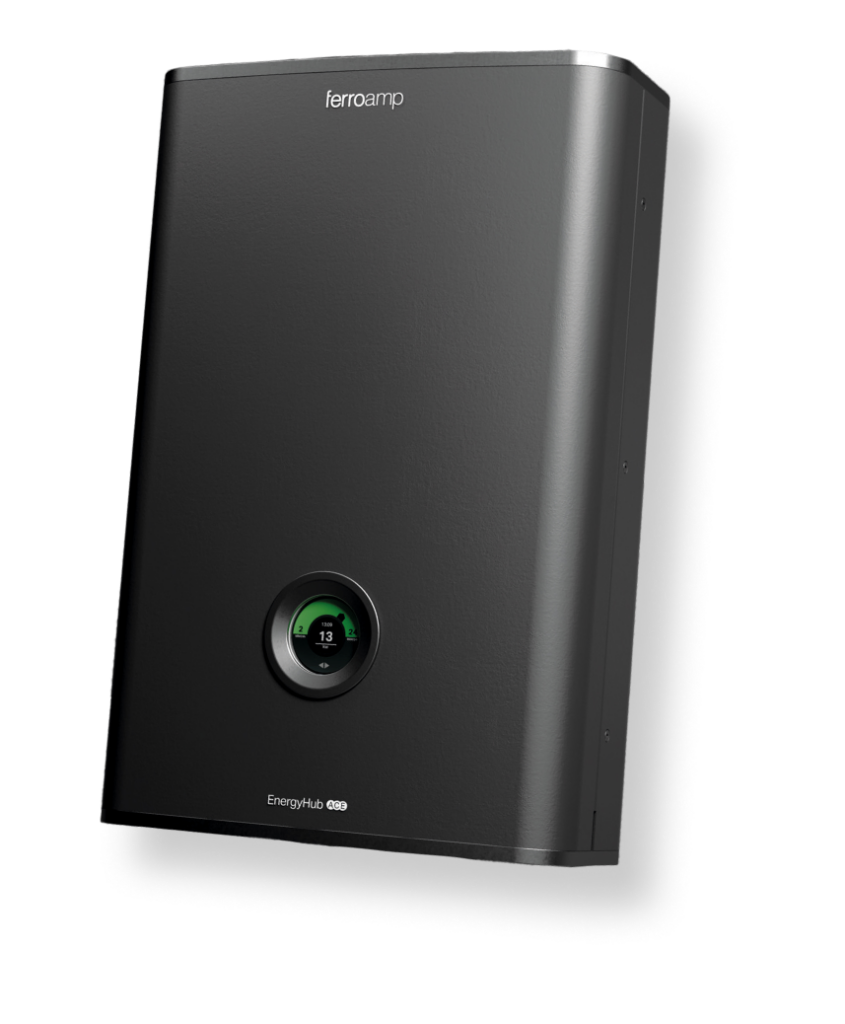
Advantages of
EnergyHub
01
Bi-directional converter
A bridge between the DC grid and the AC grid for solar cells and batteries
02
Self consumption
Maximizes self consumption of solar power
03
Cloud service
The most advanced cloud service for monitoring and flexible control
04
Phase balancing
Active phase balancing protects the main fuse
05
A seamless system
Connects solar energy, batteries and EV charging, and controls the connection to the grid
Models
EnergyHub models
Ferroamp EnergyHub comes in different sizes suitable for smaller or larger properties. EnergyHub Wall are wall mounted models that fits a private home while EnergyHub XL is delivered in a cabinet and can be expanded into a bigger system. Read more about our different models below.
14kW
EnergyHub Wall
EnergyHub Wall
Nominal AC power
14 kVA
Nominal AC voltage
230/400 VAC
Nominal grid frequency
50 Hz
DC bus voltage
760 V (nominal)
DC bus voltage range
720 - 800
Max efficiency DC to AC
98.5 %
Max efficiency AC to DC
98.0 %
Dimensions H x W x D
530 x 350 x 176 mm
Weight
23 kg
Colour
Black
Number of parallel-connected EnergyHub Wall
1 - 4 units (total 56 kVA)
Measurement data
AC x 3: voltages, current, phase angles, DC: voltage, current
Connections
Ethernet, USB, CAN, Relay output x 2
Documentation - EnergyHub Wall
Installation & User guides
File name
File type
21kW to 28kW
EnergyHub Wall
EnergyHub Wall
Nominal AC power
21 kVA, 28 kVA
Nominal AC voltage
230/400 VAC
Nominal grid frequency
50 Hz
DC bus voltage
760 V (nominal)
DC bus voltage range
720 - 800
Max efficiency DC to AC
98.5 %
Max efficiency AC to DC
98.0 %
Dimensions H x W x D
1004 x 522 x 318 mm
Weight
70 kg
Colour
Black
Number of parallel-connected EnergyHub Wall
1 - 4 units (maximum 112 kVA)
Measurement data
AC x 3: voltages, current, phase angles, DC: voltage, current
Connections
Ethernet, USB, CAN
Documentation - EnergyHub Wall
Installation & User guides
File name
File type
21-28kW moduler
EnergyHub XL
EnergyHub XL
Nominal AC power
21 kVA, 28 kVA
Nominal AC voltage
230/400 VAC
Nominal grid frequency
50 Hz
DC bus voltage
760 V (nominal)
DC bus voltage range
720 - 800
Max efficiency DC to AC
98.5 %
Max efficiency AC to DC
98.0 %
Dimensions H x W x D
220 x 520 x 650 mm
Weight
43 kg
Colour
Black
Number of parallel-connected EHUB
Up to 1000 kVA
Measurement data
AC x 3: voltages, current, phase angles, DC: voltage, current
Connections
Ethernet, USB, CAN
19" Rack cabinet
Size
24U, 42U
Dimensions H x W x D
1265 x 600 x 800 mm, 2065 x 600 x 800 mm
Weight (Without XL Modules)
82 kg, 130 kg
AC connection
Terminal block - max 70 mm2, Terminal block - max 120 mm2
DC bus connection
Terminal block - max 70 mm2, Terminal block - max 120 mm2
Documentation - EnergyHub XL
Installation & User guides
File name
File type
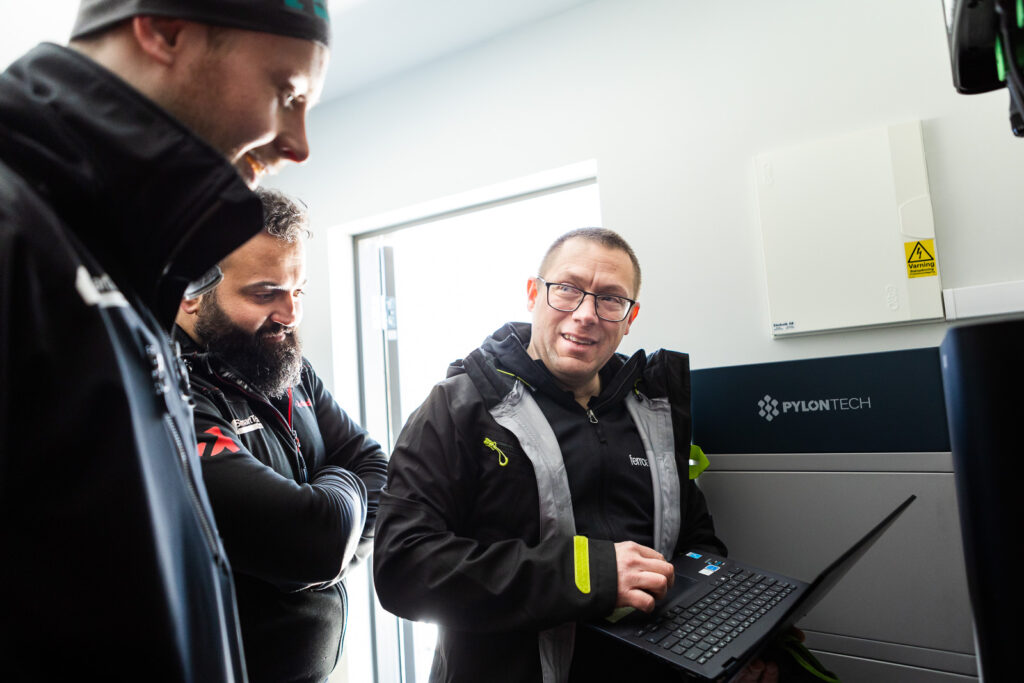
Find an installer close to you
Locate an installer close to you on the map. Only available in Sweden.
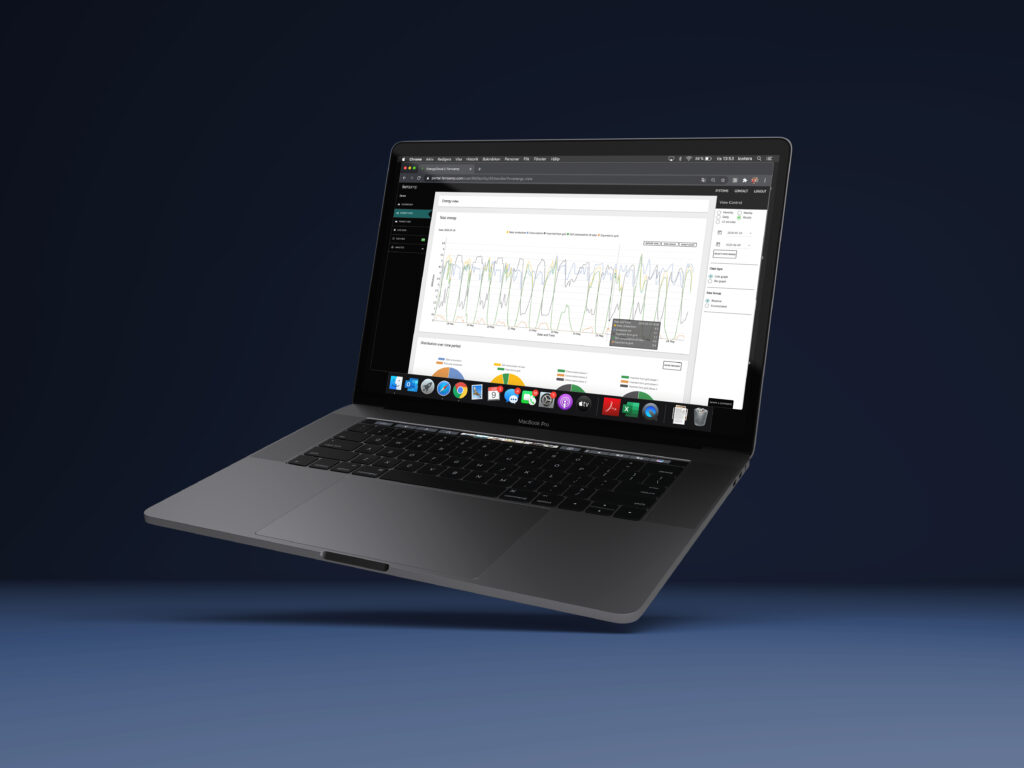
Detaljerad mätdata i realtid
I webbportalen EnergyCloud samlas all data från Ferroamp-systemet. Systemets drift visas i realtid och du får tillgång till detaljerad data om elanvändning och elproduktion i fastigheten som ger både överblick och möjlighet till djupare insikter.
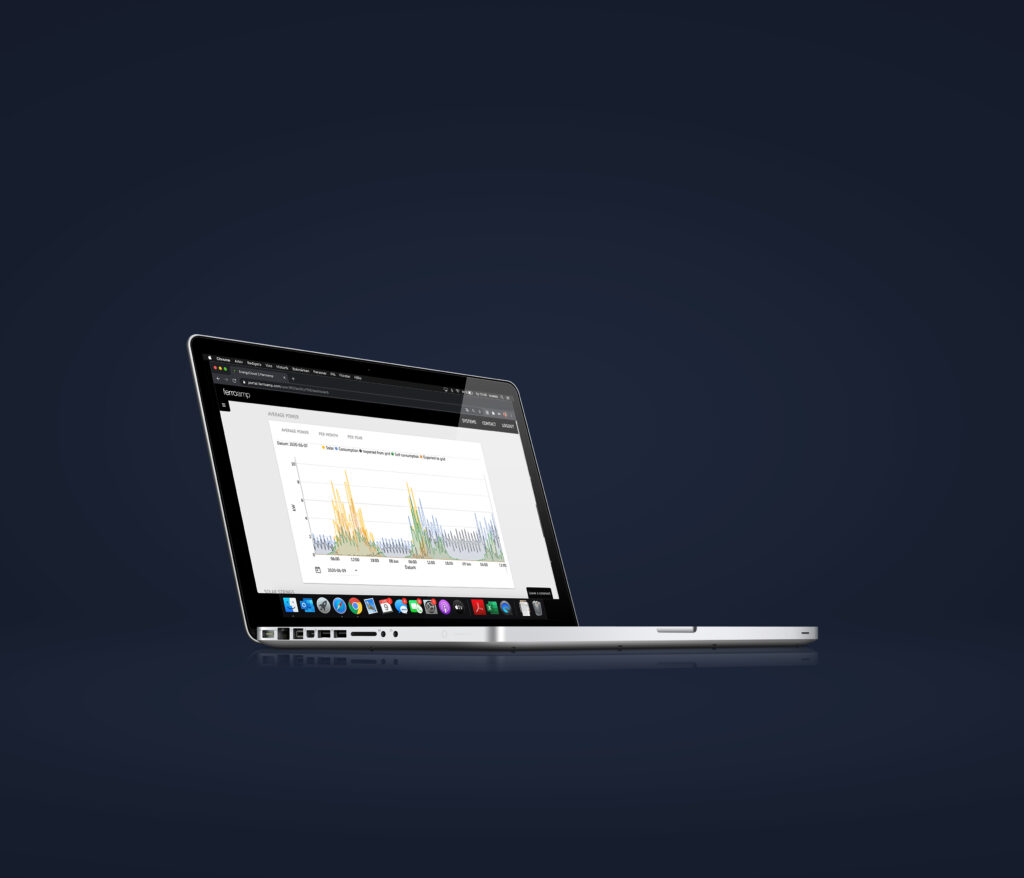
Analys och simulering
Genom analysfunktioner och simuleringsverktyg får du beslutsunderlag för kommande investeringar i fastighetens elsystem.

Ställ in systemet efter dina behov
I EnergyCloud fjärrstyr du solcellsproduktion och användning av batteriet. Optimera och schemalägg aktiviteter efter egna behov.
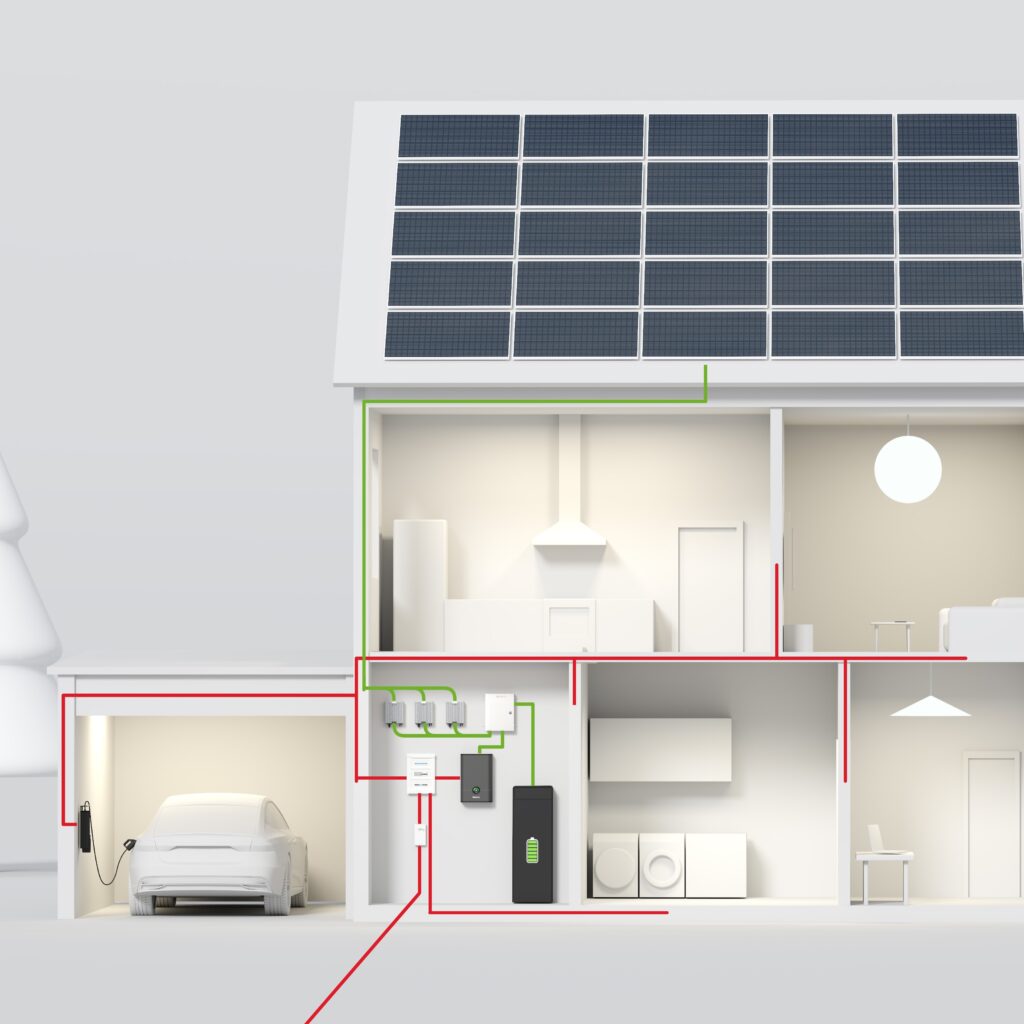
Almost all electronics in our homes are powered by direct current. LED lighting, fans, refrigerators, TVs, computers, etc. In the devices, there are small rectifiers that convert the alternating current in our wall outlets to the direct current needed to power the devices. Solar panels produce direct current, and batteries in both our homes and cars are powered by direct current. By building a direct current infrastructure, we reduce energy losses between solar cells and batteries and enable the future connection of more direct current components directly to the direct current network. This will enable significantly reduced energy losses and more efficient and intelligent energy use. Direct current technology also offers greater controllability than alternating current, resulting in a more flexible system.
PowerShare is Ferroamp’s patented technology for sharing electricity between buildings. A PowerShare connects the EnergyHub units in several different Ferroamp systems with their own grid connections in a network. This gives you the opportunity to share electricity from the solar panels and the storage capacity of the batteries between several buildings. We can then control the distribution of electricity smartly in the DC grid based on the measurement values we collect from each grid connection.
You do not need to replace your photovoltaic system to install the Ferroamp system. You can supplement your facility with an EnergyHub to get access to dynamic phase balancing, smart metering of imports, exports, energy use, etc. and to control and act as a load guard / power monitor for charging boxes for electric cars. You can also connect one or more batteries to control consumption and storage. If you also want to connect the solar cells to the Ferroamp system, you can supplement with solar string optimizers, connect the solar electricity production to the system.
battery gives you as a user a number of possibilities and freedoms. You can increase the self-consumption of solar power by charging the battery during the day and discharging it when the solar panels stop producing. The battery can also be charged from the grid at night when electricity prices are generally lower to be discharged during the morning when prices are higher. You can also keep the power output from the grid down by cutting the power peaks and discharging when consumption in the property is at its highest. With a battery, it is also possible to participate in the frequency regulation market through aggregators. This means that some of the battery’s capacity is made available to help keep the frequency on the grid, which can be lucrative.
Ferroamp EnergyHub should be installed in a weather-protected space free from condensation. Since it is powered by a fan with approximately the same noise level as a stationary computer and generates some heat load, it can be advantageously installed in a garage, basement, attic, or storage room to avoid disturbing noise.
The house will not lose power if the EnergyHub breaks down. This will only mean that:
- No solar power is produced
- The battery does not run
- Measurement and phase balancing are not active.
The house still receives electricity via its grid connection to the general electricity grid.
